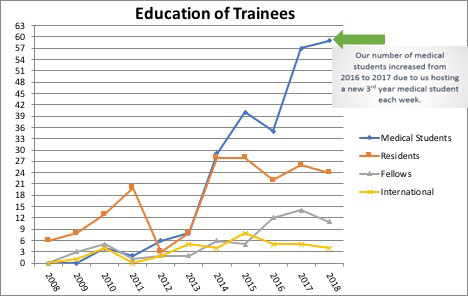Session Information
Date: Sunday, November 10, 2019
Title: Education Poster
Session Type: Poster Session (Sunday)
Session Time: 9:00AM-11:00AM
Background/Purpose: There is a shortage of pediatric rheumatologists in the United States, with current demands exceeding provider supply by 33%. This disparity is projected to increase to 61% by 2030 as the anticipated work—that is, residents pursuing pediatric rheumatology fellowships—is expected to decline below current rates. Evidence supports that early exposure to rheumatology increases a learner’s interest to pursue rheumatology as a career. For example, an adult study demonstrated 35% of current rheumatology fellows identified a clinical rotation as the most influential factor towards choosing their career. Thus we aimed to 1) increase medical students’ exposure to pediatric rheumatology at Cincinnati Children’s Hospital and Medical Center (CCHMC); and 2) identify how early educational experiences impact learners’ self-assessed career plans.
Methods: A multifaceted approach was used to provide clinical experiences in pediatric rheumatology to medical students starting in 2013, initially by conducting lectures at the medical school. Starting in 2016, third year students were offered a one-week outpatient rotation during their pediatric clerkship. Fourth year students were offered 2- or 4-week electives. From July 2018 to April 2019 third- and fourth-year students participating in these rotations were surveyed at the end of their experiences. Beginning in 2018, a survey was by our pediatric rheumatology program based on previous surveys used in the adult literature. The survey included questions related to the impact of the experiences on interest in pursuing pediatric rheumatology as a career rated on a 5-point Likert scale from strongly agree to strongly disagree.
Results: An increased number of medical students participating in pediatric rheumatology experiences occurred as a result of our curriculum (figure 1). Ninety-three percent (27/29) of third- and fourth-year medical students completed the survey in 2018. All students agreed/strongly agreed that the experience was valuable and increased their awareness of pediatric rheumatologic disease. In addition, 65% (19/29) of students agreed/strongly agreed that the rotation increased their interest in pursuing a career in pediatric rheumatology (figure 2).
Conclusion: There is a growing need for pediatric rheumatologists, and early exposure to the specialty may be one strategy to combat the future shortfall. Most medical students that participated in our curriculum reported increased interest in pursuing a career in pediatric rheumatology. Next steps include long-term follow up of participants to evaluate ultimate career choices.
To cite this abstract in AMA style:
Schultz K, Hennard T, Gregg B, Klein M, Real F, Huggins J. Addressing the Pediatric Rheumatology Physician Shortage: Does Early Exposure Matter? [abstract]. Arthritis Rheumatol. 2019; 71 (suppl 10). https://acrabstracts.org/abstract/addressing-the-pediatric-rheumatology-physician-shortage-does-early-exposure-matter/. Accessed .« Back to 2019 ACR/ARP Annual Meeting
ACR Meeting Abstracts - https://acrabstracts.org/abstract/addressing-the-pediatric-rheumatology-physician-shortage-does-early-exposure-matter/


